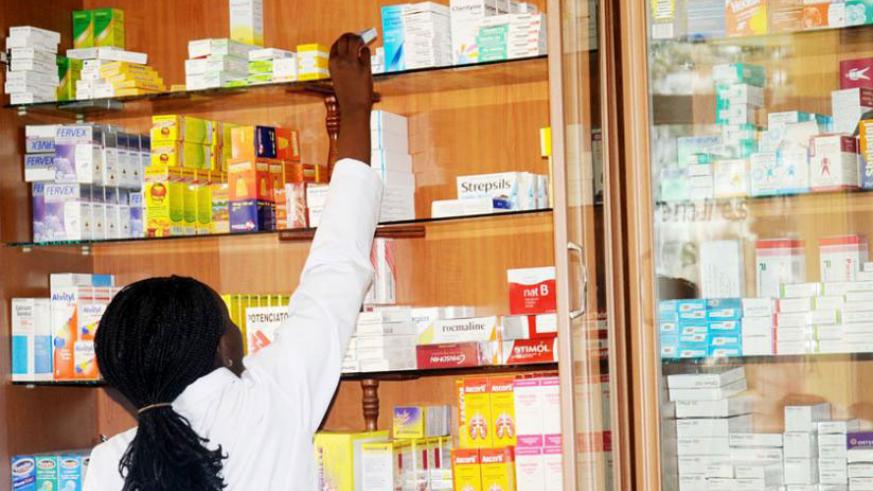

As part of marking World Pharmacist Day, the Rwanda Community Pharmacist Union (RCPU) organised a three-day symposium that coincided with their third annual conference.
And the organisers of the symposium/conference could not have chosen a better theme for the event: anti-microbial resistance, a global threat.
This is the theme that guided the professional presentations, panel discussions and participant questions, comments and contributions, over the three days that the pharmaceutical fraternity in Rwanda spent at a hotel in Kigali between September 23 and 25.
What exactly is anti-microbial resistance?
In simple, ordinary language, this means that the microbes (the small, microscopic organisms that cause human diseases) become resistant to the available medicine for curing the disease.
The most common microbes are bacteria, viruses, amoeba, and protozoa. And from the paper presentations, panel discussions, experience-sharing and general comments and observations, we each have a role to play in preventing and eliminating anti-microbial resistance.
It becomes even more pertinent to us in Africa, since we depend much on formulations developed in Europe, America and partly Asia.
Yet these areas especially America and Europe, have since eliminated diseases we still suffer from, thus their research and development is now focused on diseases affecting their society, not what plagues Africa.
The implication here is that the existing medicines for our diseases must remain effective against ‘African’ diseases. Anti-microbial resistance against existing medicines means we are in a double-jeopardy: innovations to counter the resistance will take time, by firms whose interest has since shifted from our diseases.
Who then is responsible for preventing resistance of these microbes against the medicines we have? It is everybody. From the policy maker, manufacturer, distributor, wholesaler, retailer, insurer, prescriber, dispenser, caretaker, consumer.
The starting point is to recognise and appreciate the unique nature of pharmaceutical business. This is a business that rests on two pillars: making money and saving lives. One cannot survive without the other.
A manufacturer, who appreciates that his products are for saving human life, will undertake all processes entailed in the value chain to ensure quality, affordable, available medicine.
Investment in research and development to ease the management and taking of medicines is another consideration. Here, business ethics comes in handy, and it can only be observed when we keep in mind one simple truth: the patient who will take this medicine is a human being like me.
This is the saving-life component of the pharmaceutical industry.
Pharmacovigilance using existing channels and mechanisms.
One effective way of stemming anti-microbial resistance is through pharmacovigilance. This takes various forms depending on the problem at hand, the message and target audience.
RCPU for example can take the lead in mobilising the pharmaceutical fraternity into implementing pharmacovigilance. The pharmaceutical fraternity here includes the manufacturers, wholesalers, retailers, hospitals, health centres, insurance companies, pharmacists, doctors/prescribers, nurses, pharmaceutical technicians, and laboratory technicians.
One plausible channel is the established Umuganda, in which case, the fraternity can periodically organise a special Umuganda, on a date different from the national one. On such a day, we work on a communal interest project, and at the end, we will have a special session on anti-microbial resistance: its causes, the forms it takes, its risks and how to avoid it.
Though there are less incidences of self-medication thanks to the health insurance system in Rwanda, it is still imperative to emphasize the dangers of self-medication, including misreading of symptoms, thus administering the wrong medicine for the disease.
There are actually situations of treating a no-disease, such as interpreting every fever to mean malaria or every cough to mean microbial infection. Another key issue that came up during the RCPU conference, was the question of medicines that remain in our homes once we have recovered. It was proposed that these can be collected for proper disposal/incineration.
Equally vital would be such information as HIV/AIDS matters: mode of transmission, prevention, prevalence, high risk demographics, geographical spread, trends in treatment, resistance and related information.
Thanks to the advancement in post-infection management, there is less emphasis on prevention of infection, notably to the adolescents. Yet the truth remains that AIDS still kills, it has not changed.
What has improved is the capacity to manage the infected. With a combined effort of minimal if not zero new infections and effective management of the infected, a window of hope for the defeat of the virus emerges.
Such an initiative can be well structured when we begin through organised activities such as specialUmuganda. Starting at pilot level, the successes and lessons learnt can be scaled and replicated across the country.
Rwanda is known for her innovation and cutting across the grain, and this is yet another area where groundbreaking is possible.
The author works with KPI Healthcare Rwanda Ltd, a depot pharmaceutique in Kigali.
The views expressed in this article are of the author.


